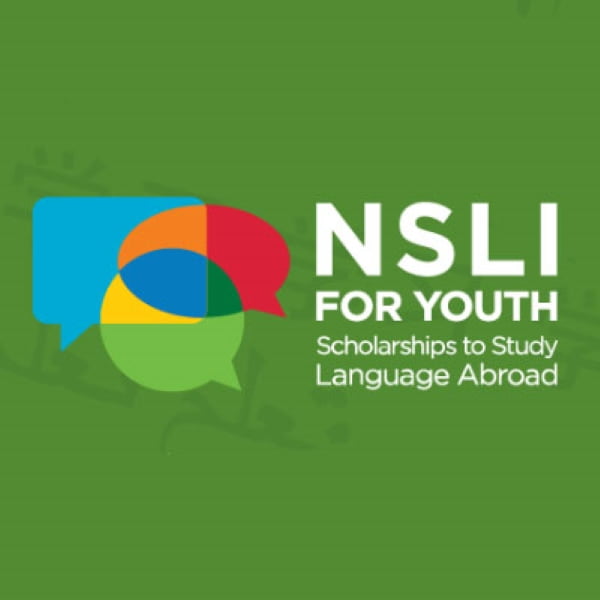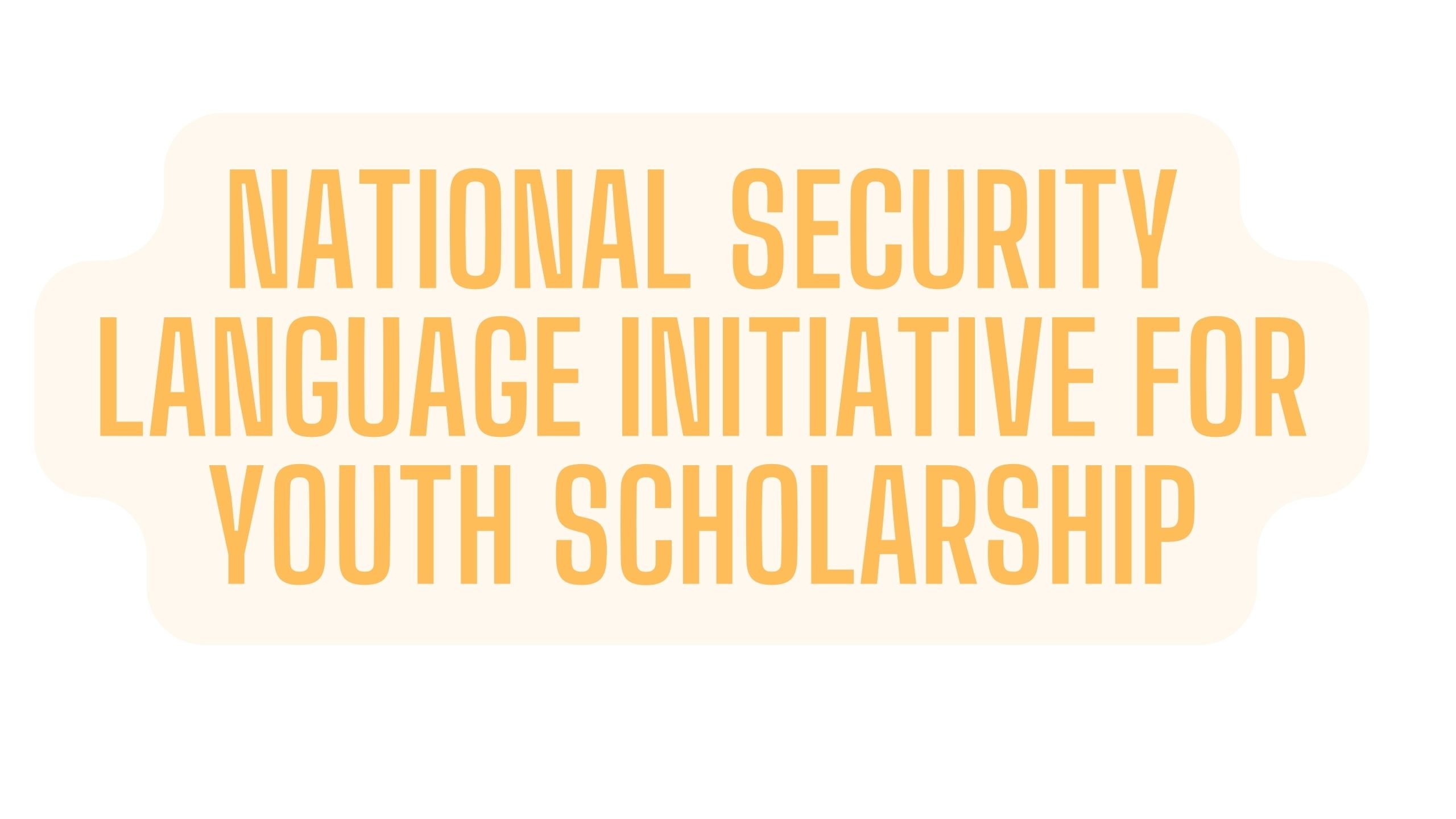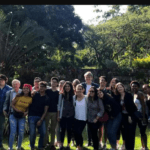National Security Language Initiative for Youth [ NSLI-Y ] is a US government initiative in partnership with the US Department of States to foster international cooperation by ensuring that the youth of the United States has very good linguistic skills and cultural knowledge deemed necessary to be able to communicate effectively.
The NSLI-Y provides good language learning opportunities overseas for American youths through merit-based scholarships to ignite a lifetime interest in language and culture learning among the American youths.
National Security Language Initiative For Youth – Language And Programs

The NSLI-Y provides intensive language immersion programs for its scholars to help them in faster language and culture learning at all the locations. Previous language knowledge is a plus but not a necessity. NSLI-Y offers the following languages:
- Arabic – The Arabic summer program seeks to increase students’ Arabic vocabulary and their ability to communicate with confidence in Arabic. The program curriculum is designed to facilitate, through immersion and intensive learning, the equivalent of one year of Arabic instruction at a U.S. university. All programs focus on Modern Standard Arabic. Classes in the colloquial dialect will also be offered to help students with everyday communication in their host communities.
Possible Locations For Arabic NSLi-Y Program – Morroco, Egypt, Jordan.
Program Dates – Summer programs last six to seven weeks and typically start in mid-June to early July and end in early to mid-August
Accommodation – Host families or a combination of group housing and host family stays
- Chinese – The Chinese summer program aims to enhance students’ ability to communicate with confidence in Mandarin. The program increases students’ Chinese language proficiency through intensive in-class language instruction, cultural presentations and activities, and host family stays. Volunteer service activities with community-focused organizations and cultural activities such as cooking, Chinese arts and crafts, and martial arts classes complement classroom learning and provide students with diverse opportunities to practice their language skills.
Possible Locations For Chinese NSLI-Y Program – China, Taiwan.
Program Dates And Accommodation – Summer programs last six to seven weeks and typically start in mid-June to early July and end in early to mid-August. And about accommodation, host families or a combination of group housing and host family stays
- Hindi – The Hindi summer program provides instruction on all four language skills – reading, writing, speaking and listening – but will focus on speaking and listening. Upon completion of the program, students will be familiar with the Devanagari alphabet and have an understanding of Hindi grammar and the different dialects of Hindi. The program will employ carefully designed learning activities to highlight the rich culture of India, as well as opportunities to explore the cultural context of the language, including Indian crafts, music, and dance, not to mention yoga and Bollywood!
Possible Locations For India NSLI-Y Program – India
Program Dates And Accommodation – The summer program lasts 6 to 7 weeks and typically begins in mid-June to early July and ends in early to mid-August. The accommodation is offered by the host families.
- Indonesian Summer Program – The Indonesian summer program aims to improve participants’ ability to communicate through reading, writing, speaking, and listening. These four language skills will be cultivated through in-class language instruction, as well as cultural presentations and activities. Volunteer work and host family stays encourage students to practice their language in real-world environments, while also offering them the opportunity to delve deeper into Indonesian culture. By the end of the program, participants will have a greater appreciation for Indonesia, including its language, religion, society, and history.
Posible Locations – Indonesia
Program Dates And Accommodation – The summer program lasts 6 to 7 weeks and typically begins in mid-June to early July and ends in early to mid-August.
Accommodation – Host families.
- Korean Summer Program – The Korean summer program gives participants the opportunity to develop their Korean language skills while improving their understanding of traditional and modern Korean culture. Instruction will be provided on all four language skills but will focus on increasing students’ speaking and listening comprehension abilities. Activities and homework assignments will be theme-based and will include structured opportunities to practice language skills outside the classroom. Korean will be the primary language of instruction, and students will be expected to speak only Korean in class and during program-related language events. Participants will maintain a portfolio of their language work and progress.
Possible Locations – South Korea
Program Dates – The summer program lasts 6 to 7 weeks and typically begins in mid-June to early July and ends in early to mid-August.
Accommodation – Host families or a combination of group housing and host family stays
- Persian [ Tajiki ] Summer Program – The program seeks to increase students’ Persian (Tajiki) vocabulary and their ability to communicate with confidence in the target language. Standard Persian is divided into three modern varieties: Farsi spoken in Iran, Dari in Afghanistan, and Tajiki in Tajikistan. Participants in the Persian summer program will study the Tajiki dialect of Persian, including the study of the Cyrillic script, focusing on the following four language skills: reading, writing, speaking and listening. These four language skills will be developed through in-class language instruction, cultural presentations and activities, volunteer work, and host family stay. Living with host families and communicating with local peers offers participants unique opportunities to utilize their language skills and gain insights into traditional Tajiki culture.
Possible Locations – Tajikistan
Program Dates – The summer program lasts 6 to 7 weeks and typically begins in mid-June to early July and ends in early to mid-August.
Accommodation – Combination of group housing and host family stays
- Russian Summer Program – The Russian summer program seeks to improve participants’ Russian in the following four skills: reading, writing, speaking and listening. These four language skills will be developed through in-class language instruction, cultural presentations and activities, and host family stays. Language classes will provide an authentic and safe environment for students to extensively study Russian for approximately 20 hours per week. In-class instruction will be supplemented by various cultural activities designed to increase participants’ knowledge of Russian culture, society, religion, and politics.
Possible Locations – Estonia, Kazakstan, Kyrgyzstan, Latvia and Moldova.
Program Dates – The summer program lasts 6 to 7 weeks and typically begins in mid-June to early July and ends in early to mid-August
Accommodation – Host families or a combination of group housing and host family stays.
- Turkish Summer Program – The Turkish summer program offers students the opportunity to increase their Turkish language skills through intensive language classes and experiential learning opportunities. Classes focus on improving speaking, listening, reading, and writing in Turkish. Host family stays provide participants with valuable opportunities for Turkish conversation and insight into Turkish culture. Cultural activities complement the formal language classes and give participants a deeper understanding of Turkish history, society, and culture.
Possible Locations – Turkey
Program Dates – The summer program lasts 6 to 7 weeks and typically begins in mid-June to early July and ends in early to mid-August
Accommodation – Host families.
National Security Language Initiative For Youth – How To Apply
The application deadline for the 2022-2023 programs was November 9, 2021, at 4:00 PM Eastern Time. Interested applicants, families, and educators can register to receive future updates about the NSLI-Y application by submitting a name and email address on the website.
National Security Language Initiative For Youth – Selection Process
1. Initial Screening And Review – This is the first stage of the selection process for the applicants for the NSLI-Y program. At this stage, trained evaluators review applications and access applicants’ motivation for language and cultural learning. Strong preference is given to applicants who have not previously participated in an overseas exchange program or lived abroad for six months or more during the past five years. Preference may also be given to applicants who may not otherwise have the opportunity to study abroad
2. Interview – Those who made it through the initial screening and review stage are then interviewed. The interview guidelines are below:
• Interviews typically last between 35-45 minutes.
• Interviews will be conducted in person or virtually.
• Volunteers with international exchange experience conduct the interviews. Interviewers may include alumni of exchange programs, educators, host families, local coordinators for exchange programs, or staff of implementing organizations not connected to selection efforts.
• The interviewers may ask questions about the candidate’s interests and goals related to language study, as well as hypothetical scenarios that might arise during the exchange experience.
• Many candidates inquire about attire for interviewing. We encourage candidates to dress neatly, for example, in a collared shirt or blouse, or a solid colour shirt. We recommend avoiding jeans, torn or ‘distressed’-style clothing, and tank tops.
•Click here for six tips you can utilize for your NSLI-Y interview.
•The interview is only one component of a comprehensive selection process and does not guarantee selection. •Candidates will be notified of their status following a final review of their application, including the interview.
3. Final Review – Here evaluators access the applicants’ language and cultural understanding, motivation, awareness and ability to adapt to new environments.
4. Final selection. Then final selection is done.







